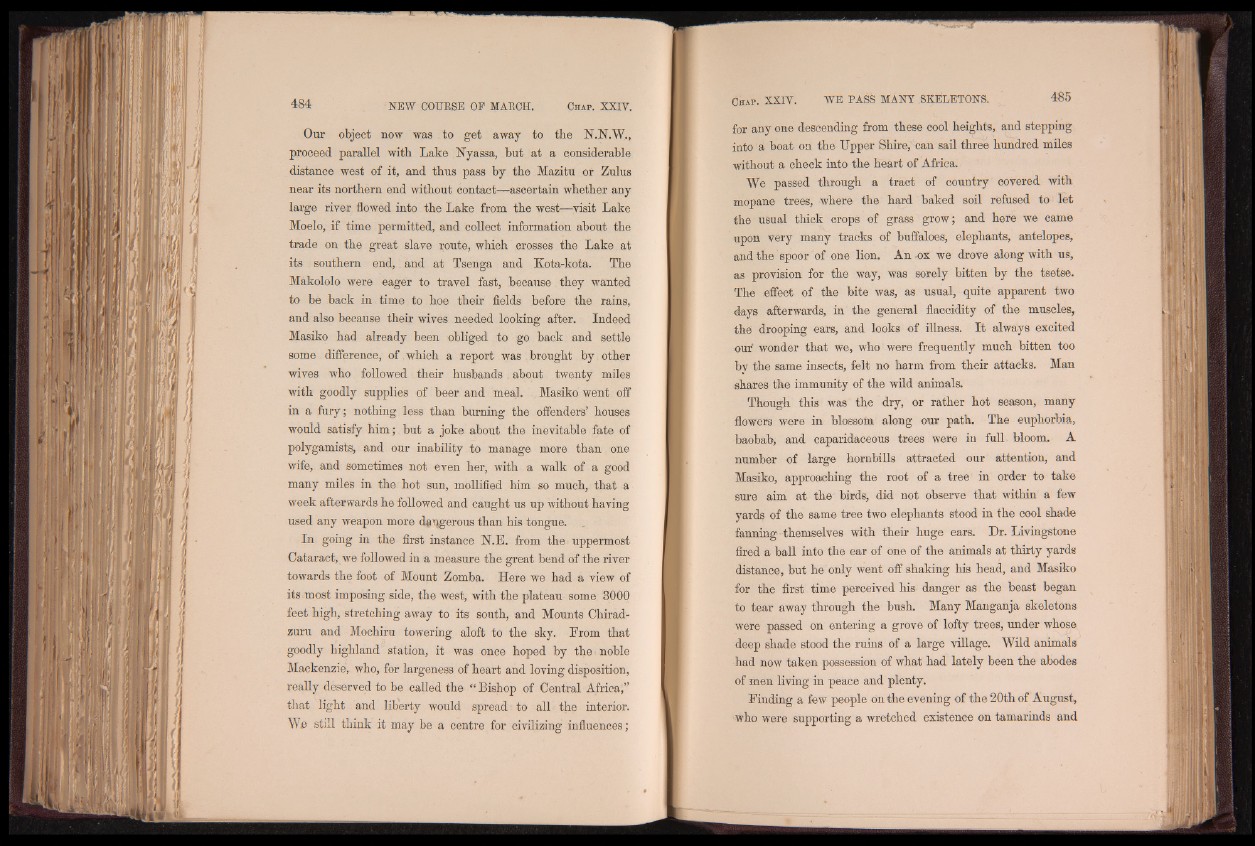
Our object now was to get away to the N.N.W.,
proceed parallel with Lake Nyassa, but at a considerable
distance west of it, and thus pass by the Mazitu or Zulus
near its northern end without contact—ascertain whether any
large river flowed into the Lake from the west—visit Lake
Moelo, if time permitted, and collect information about the
trade on the great slave route, which crosses the Lake at
its . southern end,. and at Tsenga and Kota-kota. The
Makololo were eager to travel fast, because they wanted
to be back in time to hoe their fields before the rains,
and also because their wives needed looking after. Indeed
Masiko had already been obliged to go back and settle
some difference, of which a report was brought by other
wives who followed their husbands. about twenty miles
with goodly supplies of beer and meal. Masiko went off
in a fury; nothing less than burning the offenders’ houses
would satisfy him; but a joke about the inevitable fate of
polygamists, and our inability to manage more than one
wife, and sometimes not even her, with a walk of a good
many miles in the hot sun, mollified him so much, that a
week afterwards he followed and caught us up without having
used any weapon more dgqgerous than his tongue.
In going in the first instance N.E. from the uppermost
Cataract, we followed in a measure the great bend of the river
towards the foot of Mount Zomba. Here we had a view of
its most imposing side, the west, with the plateau some 3000
feet high, stretching away to its south, and Mounts Chirad-
zuru and Mochiru towering aloft to the sky. From that
goodly highland station, it was once hoped by the noble
Mackenzie, who, for largeness of heart and loving disposition,
really deserved to be called the “ Bishop of Central Africa,”
that light and liberty would spread to all the interior.
We still think it may be a centre for civilizing influences;
for any one descending from these cool heights, and stepping
into a boat on the Upper Shire, can sail three hundred miles
without a check into the heart of Africa.
We passed through a tract of country covered with
mopane trees, where the hard baked soil refused to let
the usual thick crops of grass grow; and here we came
upon very many tracks of buffaloes, elephants, antelopes,
and the spoor of one lion. An -ox we drove along with us,
as provision for the way, was sorely bitten by the tsetse.
The effect of the bite was, as usual, quite apparent two
days afterwards, in the general flaccidity of the muscles,
the drooping ears, and looks of illness. I t always excited
ouf wonder that we, who were frequently much bitten too
by the same insects, felt no harm from their attacks. Man
shares the immunity of the wild animals.
Though this was the dry, or rather hot season, many
flowers were in blossom along our path. The euphorbia,
baobab, and caparidaceous trees were in full bloom. A
number of large hornbills attracted our attention, and
Masiko, approaching the root of a tree in order to take
sure aim at the birds, did not observe that within a few
yards of the same tree two elephants stood in the cool shade
f a n n in g themselves with their huge ears. Dr. Livingstone
fired a ball into the ear of one of the animals at thirty yards
distance, but he only went off shaking his head, and Masiko
for the first time perceived his danger as the beast began
to tear away through the bush. Many Manganja skeletons
were passed on entering a grove of lofty trees, under whose
deep shade stood the ruins of a large village. Wild animals
had now taken possession of what had lately been the abodes
of men living in peace and plenty.
Finding a few people on the evening of the 20th of August,
who were supporting a wretched existence on tamarinds and